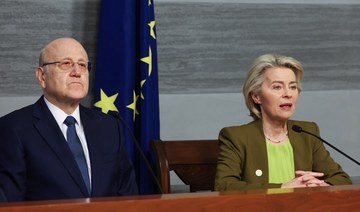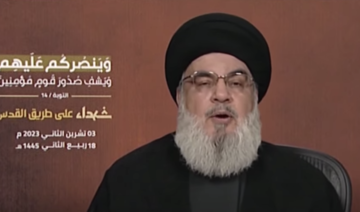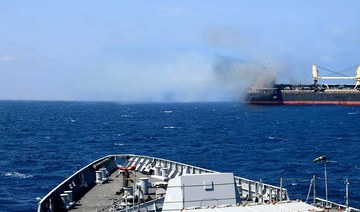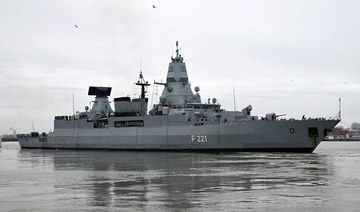ISTANBUL: Acquitted of terror charges after a stint in jail, a Turkish professor of a French university remains stranded in Istanbul, stripped of his passport and subjected to an opaque probe.
Tuna Altinel’s colleagues view the 55-year-old as another victim of a crackdown against academia and Kurdish causes that gathered force after President Recep Tayyip Erdogan survived a coup bid in 2016.
The professor of mathematical logic and set theory at Lyon’s Claude Bernard University agrees.
“I am a hostage of the Turkish state,” Altinel told AFP at his Istanbul home.
Gangly, bespectacled and occasionally sporting a shy grin, the professor’s plight gained added attention as a diplomatic feud played out in the past year between Paris and Ankara.
Altinel’s personal nightmare began in May 2019, shortly after he arrived for a holiday in Turkey.
Instead of returning well-rested to Lyon, the French city where he has taught and lived for 25 years, Altinel discovered that he was suspected of “membership in a terrorist organization.”
He was detained and tried for disseminating “terrorist propaganda” while acting as an interpreter at a pro-Kurdish meeting in France earlier that year.
Released in July 2019 and acquitted in January 2020, Altinel has since learned that he is the subject of a new Turkish investigation of which he knows little about.
That probe appears to have served as justification for the government’s refusal to return his travel documents.
Altinel first popped up on officials’ radar in 2016, when he joined nearly 2,000 academics in signing a petition demanding an end of Turkish military operations in the predominantly Kurdish southeast.
Outlawed Kurdish militants have been waging an insurgency in the mountainous region for decades that has killed tens of thousands.
But while the militants are viewed as terrorists by Turkey’s Western allies, Erdogan’s critics believe he is using the fight to suppress ethnic Kurds’ legitimate rights.
Altinel was also charged and acquitted after signing the 2016 petition. Now, he said he is “doing everything I can” to get back his passport and return to Lyon.
He has filed a lawsuit against Turkish officials and been bounced from one court to another by an “administrative machine that seeks to drown, crush people with bureaucracy,” he said.
Altinel said he has little choice but to conclude that his travel ban is punishment for his commitment to human rights and the Kurdish cause.
“The Turkish state prevents opponents who embarrass it from leaving, keeping them hostage,” he said.
“It’s a way of accepting that the country is a prison, which is a little sad.”
Altinel considers himself relatively lucky because — as a French civil servant — he still gets his salary.
He also continues to teach, in his own special way.
“When I was in prison, I taught my fellow inmates English and French,” Altinel said.
“So we continue these lessons through letters. They write to me and I write back letters that are 15 or 20 pages long. I teach them that way.”
And while waiting for his legal problems to play themselves out, he also studies Kurdish, which he began to pick up from his fellow inmates.
Although supported by other academics in France, who are campaigning for him on social media, Altinel fears being forgotten by French officials and “falling into oblivion.”
Nevertheless, and perhaps risking further alienating Turkish officials, Altinel still joins demonstrations for causes he backs in Istanbul, refusing to “self-censor.”
“If I restricted myself, it would mean I accept that the state has won,” he said. “And I do not accept that.”
gkg/zak/jz/wdb
Stranded in Turkey, professor seeks return to France
Stranded in Turkey, professor seeks return to France

- Outlawed Kurdish militants have been waging an insurgency in the mountainous region for decades that has killed tens of thousands
- Altinel said he has little choice but to conclude that his travel ban is punishment for his commitment to human rights and the Kurdish cause
US doesn’t believe ‘genocide’ occurring in Gaza: White House

- White House National Security Adviser Jake Sullivan insisted that the responsibility for peace lay with Hamas
- Biden has come under fire from Republicans for halting some weapons shipments
WASHINGTON DC: The United States does not believe that genocide is occurring in Gaza but Israel must do more to protect Palestinian civilians, President Joe Biden’s top national security official said Monday.
As ceasefire talks stall and Israel continued striking the southern city of Rafah, White House National Security Adviser Jake Sullivan insisted that the responsibility for peace lay with militant group Hamas.
“We believe Israel can and must do more to ensure the protection and wellbeing of innocent civilians. We do not believe what is happening in Gaza is a genocide,” Sullivan told a briefing.
The US was “using the internationally accepted term for genocide, which includes a focus on intent” to reach this assessment, Sullivan added.
Biden wanted to see Hamas defeated but realized that Palestinian civilians were in “hell,” Sullivan said.
Sullivan said he was coming to the White House podium to “take a step back” and set out the Biden administration’s position on the conflict, amid criticism from both ends of the US political spectrum.
Biden has come under fire from Republicans for halting some weapons shipments to press his demands that Israel hold off a Rafah offensive, while there have been protests at US universities against his support for Israel.
The US president believed any Rafah operation “has got to be connected to a strategic endgame that also answered the question, ‘what comes next?’” Sullivan added.
This would avoid Israel “getting mired in a counterinsurgency campaign that never ends, and ultimately saps Israel’s strength and vitality.”
First international UN staff member killed in Gaza attack

- Guterres “was deeply saddened to learn of the death of a UN DSS staff member and injury to another DSS staffer when their UN vehicle was struck,” spokesperson said
- “The Secretary-General condemns all attacks on UN personnel and calls for a full investigation,” Haq said
UNITED NATIONS: A UN security services member was killed in an attack on a vehicle in Gaza on Monday, a spokesperson said, adding the death was the first international UN employee killed in the Palestinian territory since the war began.
UN chief Antonio Guterres “was deeply saddened to learn of the death of a United Nations Department of Safety and Security (DSS) staff member and injury to another DSS staffer when their UN vehicle was struck as they traveled to the European Hospital in Rafah,” said his deputy spokesperson Farhan Haq.
It was “the first international casualty” for the UN since the start of the Israeli offensive in Gaza in retaliation for the Hamas attack of October 7, Haq said, recalling that some 190 Palestinian UN employees have been killed, mainly staff of the UN Palestinian Refugee Agency (UNRWA).
“The Secretary-General condemns all attacks on UN personnel and calls for a full investigation,” Haq said.
The spokesman did not immediately release the nationality of the person killed.
“I don’t have the full details of whether this was part of a large convoy or not, I believe it was in a convoy that was moving, and this was the DSS vehicle that was hit,” he said.
The DSS oversees the security of UN agencies and programs in more than 130 countries around the world.
Hezbollah chief urges Beirut to allow Syrian migrant boats to leave for Europe

- Hassan Nasrallah called for ‘a national decision that says: we have opened the sea... whoever wants to leave for Europe, for Cyprus, the sea is in front of you. Take a boat and board it’
- Cyprus, the EU’s easternmost member, is less than 200 kilometers (125 miles) from Lebanon and Syria, and wants to curb migrant boat departures from Lebanon toward its shores
BEIRUT: Hezbollah chief Hassan Nasrallah on Monday urged Lebanese authorities to open the seas for migrant boats to reach Europe, amid soaring anti-Syrian sentiment and accusations the West is seeking to keep refugees in Lebanon.
His remarks came in an apparent bid to pressure the European Union after it announced earlier this month $1 billion in aid to Lebanon to help tackle irregular migration.
Many in crisis-hit Lebanon have criticized the aid package as focused on preventing refugees from leaving the country, amid mounting calls for them to return home.
In a televised address, Nasrallah called for “a national decision that says: we have opened the sea... whoever wants to leave for Europe, for Cyprus, the sea is in front of you. Take a boat and board it.”
But “we do not propose forcing displaced Syrians to board boats and leave for Cyprus and Europe,” he added in the speech, broadcast on the group’s Al-Manar television channel.
Cyprus, the EU’s easternmost member, is less than 200 kilometers (125 miles) from Lebanon and Syria, and wants to curb migrant boat departures from Lebanon toward its shores.
Currently refugees “are prohibited (from leaving), and so they turn to smuggling and to rubber boats, and there are drownings in the sea, because the Lebanese army is implementing a political decision to stop them from migrating,” Nasrallah added.
Lebanon says it currently hosts around two million people from neighboring Syria — the world’s highest number of refugees per capita — with almost 785,000 registered with the United Nations.
Lebanon needs to tell the West that “we all have to coordinate with the Syrian government to return the displaced to Syria and to present them with aid there,” Nasrallah said.
He also urged Lebanon’s parliament to press the EU and Washington to lift sanctions on Syria that Damascus says are blocking aid and reconstruction efforts, adding: “If sanctions on Syria aren’t lifted, there will be no return” of refugees.
Nasrallah’s remarks came a day before Lebanon is expected to resume “voluntary returns” of Syrians, with dozens of families set to pass through two land border crossings in the country’s east, a year and a half after such returns were paused.
Lebanon’s economy collapsed in late 2019, turning it into a launchpad for migrants, with Lebanese joining Syrians and Palestinian refugees making perilous Europe-bound voyages.
Some Lebanese politicians have blamed Syrians for their country’s worsening troubles, and pressure often mounts ahead of an annual conference on Syria in Brussels, with ministers meeting this year on May 27.
Rights groups including Amnesty International and Human Rights Watch have warned that Syria is not safe for returns.
No pollution from ship hit by Houthis in Red Sea, Yemeni minister says

- A Yemeni government official told Arab News on Monday that the UN team, made up of experts from various UN bodies, informed the Aden-based Yemeni government that rescuing the ship was “impossible”
AL-MUKALLA: Yemen’s Water and Environment Minister Tawfeeq Al-Sharjabi said his ministry found no signs of pollution from a ship filled with fertilizer and gasoline that sunk in the Red Sea.
“No leakage has come from the vessel yet, although it remains an environmental concern at all times,” the Yemeni minister told Arab News. He urged the world to assist the war-torn country in recovering the vessel.
In February, Yemen’s Houthi militia fired missiles at the Belize-flagged and Lebanese-operated MV Rubymar, which was carrying 22,000 tonnes of ammonium phosphate-sulfate NPS fertilizer and more than 200 tonnes of fuel while sailing in the Red Sea, severely damaging it and causing a large oil slick in the sea.
The ship eventually sank, prompting warnings from authorities as well as local and international environmentalists that the ship’s cargo could seep into the water or explode.
The Houthi attack on the ship was part of a larger operation targeting naval and commercial ships in the Red Sea, Bab Al-Mandab Strait and the Gulf of Aden, which the Yemeni militia claims is in support of the Palestinians.
At the same time, a UN team that examined the sinking ship in March concluded that it could not be recovered owing to the expense and a lack of equipment, suggesting that the ship be left to sink.
A Yemeni government official told Arab News on Monday that the UN team, made up of experts from various UN bodies, informed the Aden-based Yemeni government that rescuing the ship was “impossible” and advised the Yemeni government to continue monitoring the ship via a remotely operated vehicle, as well as the country’s coastline for signs of pollution.
“The UN team said that they hoped the ship would sink to the bottom of the sea and that the leaking would occur in stages, allowing the fertilizer to disintegrate and causing no harm. Their primary fear is that the leak may occur in a single day,” a Yemeni government official said, adding that recovering the ship would be more difficult the deeper it sank.
As for the ship’s fuel load, the UN team believed that it would not do much harm if it spilled into the water gradually, but they did not rule out the option of sucking it from the ship via pipes, the Yemeni official said.
Meanwhile, the US Central Command said that its forces on Sunday shot down a drone over the Gulf of Aden that was launched by the Houthis from regions under their control. The Houthis have not claimed credit for the new wave of drones and ballistic missiles intercepted by the US-led maritime coalition in the Red Sea since Thursday.
This comes as the EU mission in the Red Sea, known as Eunavfor Aspides, said on Monday that a Dutch warship, HNLMS Karel Doorman, has joined its fleet of ships in the Red Sea to safeguard commercial ships against Houthi attacks.
“We thank the Netherlands for their swift and precious contribution. EUNAVFOR ASPIDES is getting stronger,” the EU mission said in a post on X.
Turkiye’s Erdogan hosts Greek PM, sees ‘no unsolvable problems’ in bilateral ties

- “Despite disagreements, we focus on a positive agenda by keeping our dialogue channels open,” Erdogan said
- “We showed today that alongside our proven disagreements, we can chart a parallel page of agreements,” Mitsotakis said
ANKARA/ATHENS: Turkish President Tayyip Erdogan told Greek Prime Minister Kyriakos Mitsotakis during talks in Ankara on Monday that there were “no unsolvable problems” between their countries.
Turkiye and Greece, NATO allies and historic foes, have long been at odds over issues including maritime boundaries, energy resources in the eastern Mediterranean, flights over the Aegean Sea, and ethnically split Cyprus.
After years of tensions that brought the two to the brink of conflict, they have started taking high-profile steps to improve ties, especially since both leaders were re-elected last year.
“Despite disagreements, we focus on a positive agenda by keeping our dialogue channels open,” Erdogan told a joint press conference with Mitsotakis.
Mitsotakis said the leaders’ frequent meetings in recent months had “proved that we neighbors can establish an approach of mutual understanding, not as an exception but as a productive normality.”
“We showed today that alongside our proven disagreements, we can chart a parallel page of agreements,” he added.
Erdogan visited Athens last December and the two countries signed the “Declaration of Athens” aimed at setting the base for a roadmap to rebooting relations.
They agreed to boost trade, keep communication channels open, carry out military confidence-building measures to reduce tensions, and work on problems that have kept them apart.
The two leaders disagreed over how to classify the Palestinian militant group Hamas. Erdogan reiterated his view that it is a “resistance movement” and said he was saddened by the Greek view — shared by many other Western countries — that it is a terrorist organization.
“Let’s agree to disagree,” Mitsotakis replied.
“Unprecedented heights”
On Sunday, Mitsotakis told Turkish daily Milliyet that his visit to Ankara — the first in five years — was an opportunity to evaluate progress and to reiterate Athens’ commitment to improving ties.
Erdogan, speaking to Greek daily Kathimerini on Sunday, said the main goal was to “raise the level of our bilateral relations to unprecedented heights,” adding the neighbors had many issues they could agree on while seeking solutions to their problems.
However, the allies remain at loggerheads over several issues including maritime jurisdiction.
Greece’s plan to build a marine park in the Aegean, which it says is for environmental purposes, has upset Turkiye, while Athens was annoyed by Turkiye’s decision to turn the ancient Chora church, previously a museum for decades, into a mosque.




















